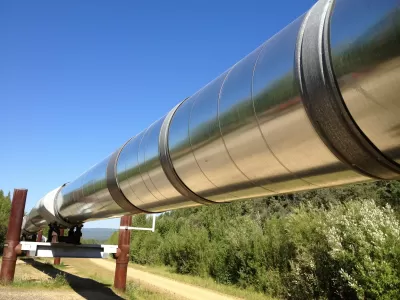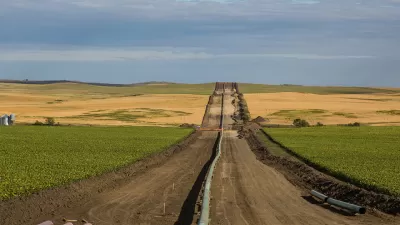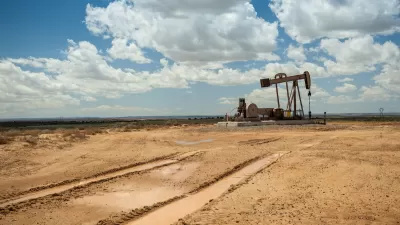Safety is one trigger in the heated debate over whether fossil fuels should be transported by pipeline. While the industry insists the method is safer than others, the spread of accidents since 1986 is substantial.

[Updated Dec. 9, 2016]
In the wake of the protests at Standing Rock, oil and gas pipelines remain as fraught an issue as ever. George Joseph writes, "Oil industry supporters argue that pipelines are safer alternative to hauling fuel by tanker trucks or freight trains. [...] Environmentalists, however, point to a lack of adequate state and federal regulation and the difficulties of maintaining millions of miles of aging pipeline infrastructure."
The statistics bear some of those worries out. "Over the last twenty years, more than 9,000* significant pipeline-related incidents have taken place nationwide, according to data from the Pipeline and Hazardous Materials Safety Administration. The accidents have resulted in 548 deaths, 2,576 injuries, and over $8.5 billion in financial damages."
[*Editor's note: A representative at the Pipeline and Hazardous Materials Administration (PHMA) of the U.S. Department of Transportation contacted Planetizen to point out that the reported 20-year total of significant pipeline incidents is 5,675. Incidents deemed significant have resulted in 347 fatalities, 1,346 injuries, and $7.5 billion in costs. All data for pipeline incidents, significant and otherwise, are available online.]
Using federal data compiled by environmental advocate Richard Stover, CityLab mapped out all major pipeline accidents occurring from 1986 through 2016. "Significant pipeline-related incidents have picked up in recent years in certain states. In Texas, for example, the effects of the state's drilling boom may be seen in its increased accident rate: since 2009 the state has had 497 incidents, over a hundred more than in the seven years before."
FULL STORY: 30 Years of Oil and Gas Pipeline Accidents, Mapped

Trump Administration Could Effectively End Housing Voucher Program
Federal officials are eyeing major cuts to the Section 8 program that helps millions of low-income households pay rent.

Planetizen Federal Action Tracker
A weekly monitor of how Trump’s orders and actions are impacting planners and planning in America.

Ken Jennings Launches Transit Web Series
The Jeopardy champ wants you to ride public transit.

Driving Equity and Clean Air: California Invests in Greener School Transportation
California has awarded $500 million to fund 1,000 zero-emission school buses and chargers for educational agencies as part of its effort to reduce pollution, improve student health, and accelerate the transition to clean transportation.

Congress Moves to End Reconnecting Communities and Related Grants
The House Transportation and Infrastructure Committee moved to rescind funding for the Neighborhood Equity and Access program, which funds highway removals, freeway caps, transit projects, pedestrian infrastructure, and more.

From Throughway to Public Space: Taking Back the American Street
How the Covid-19 pandemic taught us new ways to reclaim city streets from cars.
Urban Design for Planners 1: Software Tools
This six-course series explores essential urban design concepts using open source software and equips planners with the tools they need to participate fully in the urban design process.
Planning for Universal Design
Learn the tools for implementing Universal Design in planning regulations.
Heyer Gruel & Associates PA
Ada County Highway District
Institute for Housing and Urban Development Studies (IHS)
City of Grandview
Harvard GSD Executive Education
Toledo-Lucas County Plan Commissions
Salt Lake City
NYU Wagner Graduate School of Public Service





























